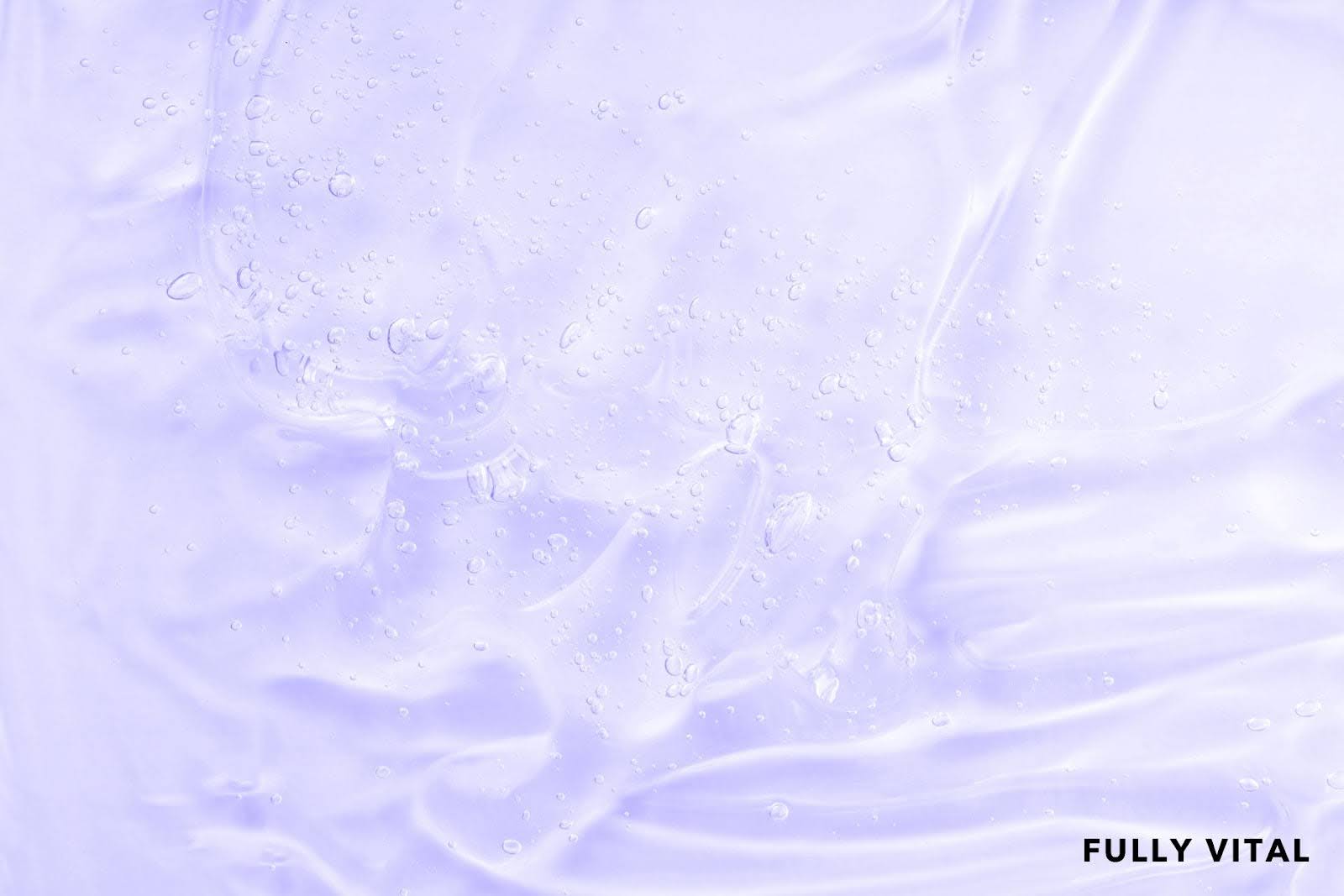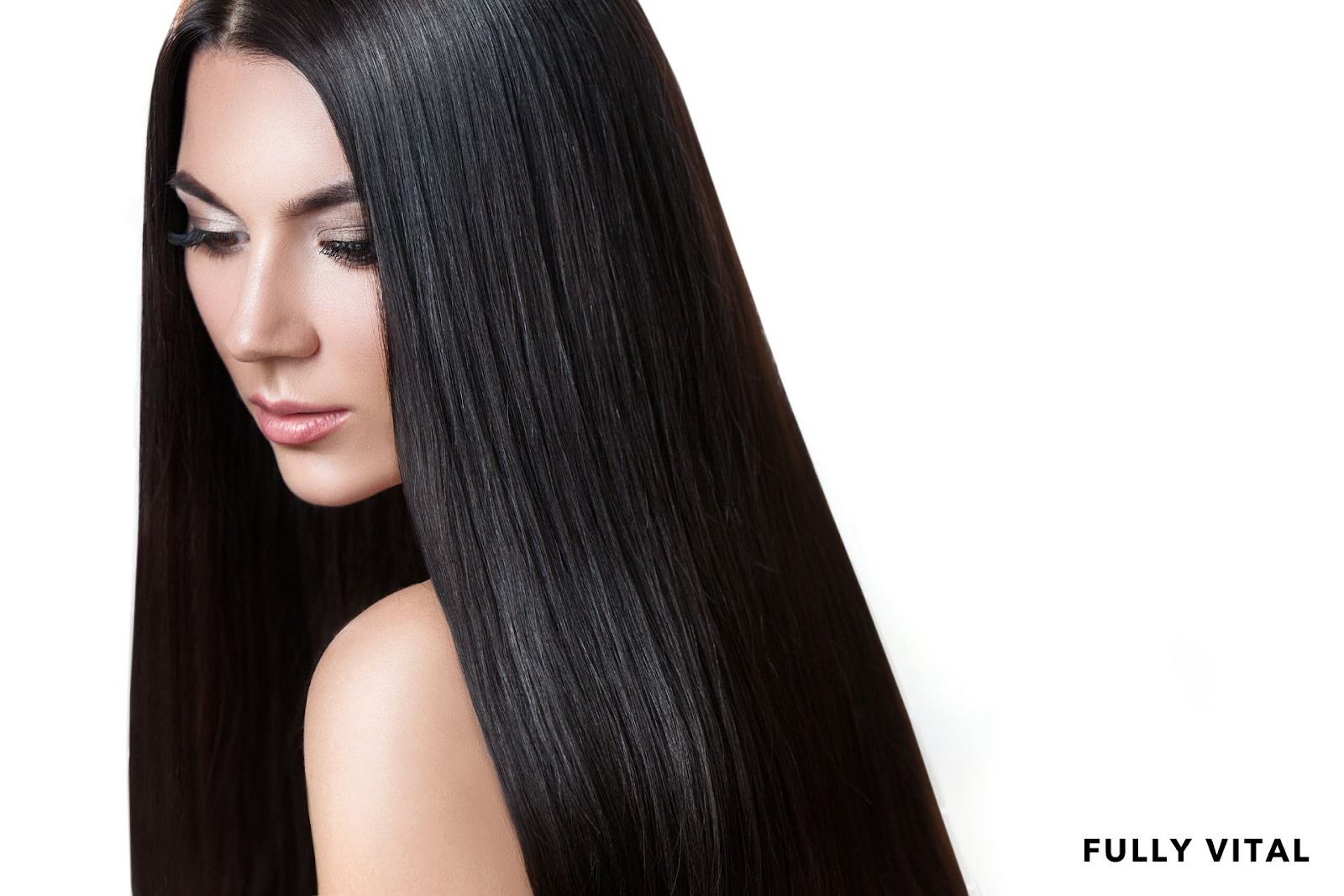
Ceramides: Your Secret Weapon For Locking In Scalp Moisture
Maintaining a healthy scalp is foundational to achieving vibrant, strong hair.
In the pursuit of optimal hair health, one ingredient stands out for its remarkable ability to preserve moisture right where it's needed most: ceramides.
These lipid molecules are naturally present in our skin and scalp, playing a crucial role in maintaining the barrier that locks in moisture, protecting against environmental damage and dehydration.
As we navigate through the benefits and applications of ceramides, this article aims to equip you with everything you need to know about using ceramides as a key component of your hair care routine.
From understanding their science-backed benefits to incorporating them effectively, we're here to guide you on your journey to healthier scalp and hair.

I LOVE MY HAIR NOW
FullyVital hair serum and hair vitamins made tremendous improvements in my hair. I truly love my hair now.
Shop Hair ProductsWhat Are Ceramides?
Ceramides are a type of lipid or fat that is naturally found in high concentrations in the uppermost layers of skin, including the scalp.
They play a pivotal role in creating a protective barrier that locks in moisture and shields the skin from harmful environmental factors like pollutants and irritants.
This barrier not only helps to maintain the skin's hydration but also ensures its resilience against external stressors, contributing to the skin's overall health and appearance.
Ceramides In Our Scalp And Hair
In the context of scalp health, ceramides are equally vital.
They help to maintain the scalp's moisture balance, preventing dryness and flakiness, which can lead to discomfort and impair hair growth.
For hair strands, ceramides work by sealing the cuticle layer, which is the hair's protective outer layer.
This sealing action helps to lock in moisture and protein, leading to reduced breakage, less frizz, and an overall smoother, shinier appearance.
Essentially, ceramides help in maintaining the integrity of the hair and scalp's protective barriers, promoting a healthy environment for hair growth and retention.
Why Is Scalp Moisture Important?
The Role Of Moisture In Scalp Health
A well-moisturized scalp is the foundation of healthy hair growth.
Moisture in the scalp helps to ensure that the skin remains flexible, resilient, and able to support hair follicles adequately.
It prevents the scalp from becoming dry, itchy, and flaky, conditions that can lead to discomfort and, potentially, hair thinning or loss.
Proper hydration of the scalp also promotes a balanced environment for hair follicles, encouraging healthy hair growth cycles.
How Dryness Affects The Scalp And Hair
Dryness can compromise the scalp's health, leading to issues such as dandruff, sensitivity, and irritation.
These problems can not only cause discomfort but also affect the hair's growth and appearance.
When the scalp is dry, hair follicles are not supported in an optimal environment, potentially leading to weaker hair growth and increased hair fall.
Additionally, dryness can cause hair strands to become brittle, lackluster, and prone to breakage, highlighting the importance of maintaining scalp moisture for overall hair health.

How Do Ceramides Lock In Scalp Moisture?
The Mechanism Of Action
Ceramides function by integrating themselves into the lipid layer of the scalp's skin, where they fill in the gaps between skin cells and create a barrier to prevent moisture loss.
This barrier not only retains moisture but also protects the scalp from environmental pollutants and irritants.
By reinforcing the scalp's natural protective layer, ceramides help to maintain optimal hydration levels, ensuring the scalp remains healthy and capable of supporting robust hair growth.
Comparing Ceramides To Other Moisturizing Agents
Unlike other moisturizing agents that might simply sit on the surface of the skin or temporarily provide moisture, ceramides work by enhancing the skin's own moisture-retention capabilities.
This results in a more long-lasting and effective hydration solution.
While ingredients like hyaluronic acid attract moisture to the skin's surface, ceramides secure this moisture within the skin's barrier, preventing its evaporation and promoting sustained scalp health.
This dual approach of attracting and locking in moisture makes ceramides particularly effective in maintaining scalp hydration and overall hair health.
What Are The Benefits Of Ceramides For Scalp And Hair?
Enhancing Scalp Health
Ceramides contribute significantly to scalp health by maintaining moisture levels and enhancing the skin's natural barrier.
This moisture retention prevents dryness and flakiness, reducing the risk of scalp irritation and promoting a healthy environment for hair follicles.
A healthy scalp is crucial for the growth of strong, healthy hair, as it provides a nourished base from which hair can grow.
Improving Hair Texture And Strength
For hair, ceramides play a critical role in preserving the hair's cuticle integrity.
By sealing the cuticle layer, ceramides help to protect the hair from moisture loss and damage caused by environmental factors, such as UV rays and pollution.
This protection helps to reduce breakage, minimize frizz, and enhance the hair's overall texture and strength.
As a result, hair appears smoother, shinier, and more resilient.
The use of ceramides in hair care products can thus lead to noticeable improvements in hair quality and health.
How Can You Incorporate Ceramides Into Your Hair Care Routine?
Topical Treatments And Products
Incorporating ceramides into your hair care routine is straightforward with the availability of a variety of topical products.
Look for shampoos, conditioners, and leave-in treatments that list ceramides as key ingredients.
These products are formulated to deliver ceramides directly to your scalp and hair, reinforcing the moisture barrier and improving hair texture.
Regular use of ceramide-enriched hair products can help maintain optimal scalp health and enhance the strength and appearance of your hair.
Dietary Sources And Supplements
In addition to topical treatments, consuming foods rich in ceramides or taking ceramide supplements can also benefit scalp and hair health from the inside out.
Foods like wheat germ, brown rice, and spinach contain natural ceramides and can support your body's overall lipid barrier, including that of the scalp.
Ceramide supplements, often derived from wheat or rice, can provide a concentrated dose of these beneficial lipids, potentially improving skin and scalp hydration levels and promoting healthier hair growth.

What Does Research Say About Ceramides And Hair Health?
Research underscores the effectiveness of ceramides in enhancing scalp moisture and hair strength.
Studies show that ceramides help in restoring the scalp's barrier, leading to improved hydration and reduced dryness.
Additionally, they reinforce the hair cuticle, minimizing breakage and boosting shine.
This evidence positions ceramides as a vital ingredient in hair care products for healthier, stronger hair.
As research advances, it continues to clarify ceramides' role in optimal hair care practices.
Are There Any Side Effects?
Understanding The Risks
Ceramides are generally considered safe for topical use and are well-tolerated by most individuals.
Being a natural component of skin and hair, they mimic the body's own moisture-preserving mechanisms, minimizing the risk of adverse reactions.
However, like any skincare or haircare ingredient, there's a small chance of sensitivity or allergic reaction, particularly in individuals with sensitive skin or specific allergies.
When To Consult A Professional
If you experience irritation, redness, or any discomfort after using products containing ceramides, it's advisable to discontinue use and consult a dermatologist.
This is particularly important for individuals with pre-existing scalp conditions or sensitive skin, who may require personalized advice on incorporating ceramides into their hair care routine safely.
Explore The Strength Of Fully VitalStruggling with hair thinning or signs of aging? Your search ends with Fully Vital. Our range of hair growth solutions tackles every concern, from diminished density to vitality loss. Key advantages and features of our offerings include:
Eager to reclaim your hair's health and vigor? Experience the transformative impact of Fully Vital. |
Final Thoughts On Ceramides
Ceramides stand out as a key ingredient for maintaining scalp moisture and enhancing hair health.
By reinforcing the skin's natural barrier, ceramides help lock in moisture, reduce dryness, and protect against environmental damage.
Their benefits extend across all hair types, improving texture, strength, and overall appearance.
While generally safe and beneficial, individuals with sensitive skin should approach with caution and consult a professional if needed.
Incorporating ceramides into your hair care routine, whether through topical products or dietary sources, can significantly contribute to healthier, more resilient hair.
As research continues to evolve, the potential of ceramides in hair care becomes even more promising, offering a solid foundation for anyone looking to improve their scalp and hair health.
Dive deeper into the benefits of ceramides with Fully Vital's Enhance Hair Serum (3-Pack), a perfect addition to your hair care regimen for stronger, more vibrant hair.
Read Also:
Frequently Asked Questions About Ceramides
How quickly can I expect to see results from using ceramide-infused hair products?
Results can vary, but many people notice improvements in hair texture and scalp health within a few weeks of consistent use.
Can ceramides help with hair loss?
While ceramides primarily improve hair texture and scalp moisture, healthy scalp conditions supported by ceramides can indirectly benefit hair growth and reduce hair loss.
Are ceramide products suitable for colored or chemically treated hair?
Yes, ceramide products are beneficial for colored or treated hair, helping to restore moisture and protect against further damage.
Can I use ceramides with other hair care ingredients?
Absolutely.
Ceramides work well with other ingredients like proteins and hyaluronic acid, enhancing overall hair health.
How often should I use ceramide hair care products?
Follow the product instructions, but most ceramide products are safe for daily use and can be incorporated into your regular hair care routine.
Is there anyone who should avoid using ceramides?
People with known allergies to specific ceramide sources or ingredients in ceramide products should avoid use.
When in doubt, consult with a dermatologist.
Can using ceramide products make my hair oily?
Properly formulated ceramide products should not make your hair oily.
They are designed to absorb and improve hair's natural barrier without leaving a greasy residue.
Do ceramide supplements offer the same benefits as topical products?
Ceramide supplements can improve overall skin hydration, including the scalp, but topical products directly address hair and scalp health more effectively.
How do I choose the best ceramide product for my hair type?
Look for products formulated for your hair type (dry, oily, curly, etc.) and consider the concentration of ceramides, aiming for products where ceramides are prominently listed.
Can children use ceramide products for their hair and scalp?
Yes, but choose products specifically formulated for children or sensitive skin to ensure they are gentle enough for young scalps.
Sources:
- Bernard, B. A., Franbourg, A., Francois, A. M., Gautier, B., & Hallegot, P. (2002). Ceramide binding to African-American hair fibre correlates with resistance to hair breakage. International Journal of Cosmetic Science, 24(1), 1–12. https://doi.org/10.1046/j.0412-5463.2001.00106.x
- Tosti, A., & Schwartz, J. R. (2021). Role of scalp health in achieving optimal hair growth and retention. International Journal of Cosmetic Science, 43(S1). https://doi.org/10.1111/ics.12708
- Oh, J. H., Jeong, K. H., Kim, J. E., & Kang, H. (2019). Synthesized Ceramide Induces Growth of Dermal Papilla Cells with Potential Contribution to Hair Growth. Annals of Dermatology, 31(2), 164–174. https://doi.org/10.5021/ad.2019.31.2.164








